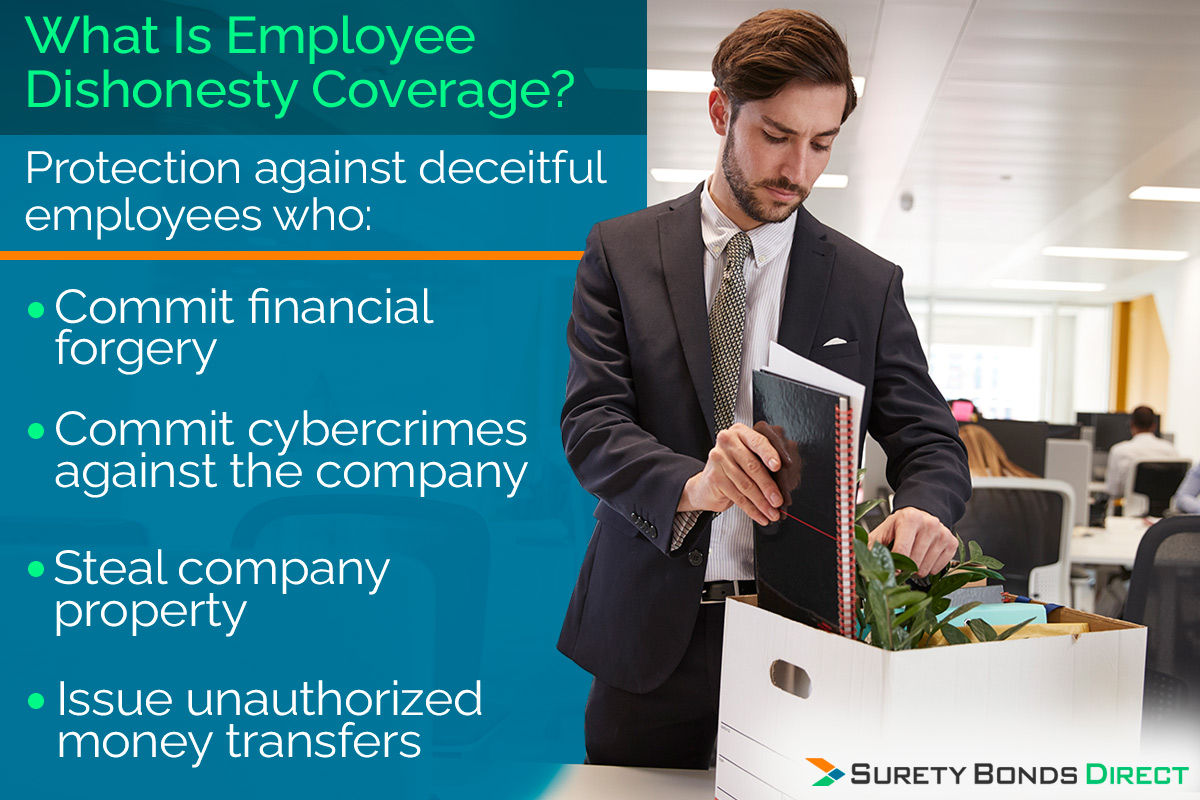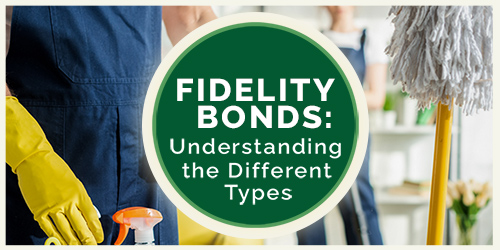Many businesses have employees with access to sensitive information, financial assets, or valuable physical property. This opens the business to the potential of employee theft or misconduct with these business assets. Obtaining the proper insurance to cover employee theft committed against the employing business is confusing.
This article will help explain:
- What employee dishonesty coverage is
- The difference between employee theft and business owners insurance
- The difference between coverage for employee theft against the business and theft committed against customers
- How an employee dishonesty bond compares against an ERISA bond
- Plus how to get an employee dishonesty bond for the lowest possible price
What Is Employee Dishonesty Coverage?

Watch our video explaining what an employee dishonesty bond is when it should be considered.
This type of coverage is know by a few other names:
- Crime bond
- Fidelity bond
- Dishonesty bond
These all refer to a type of surety bond called an employee dishonesty bond. A dishonesty bond is purchased by a business owner to protect against employees who have access to:
- Company finances and accounts
- The ability to issue bank checks
- Valuable property
- Even valuable digital property
Deceitful employees may purposefully:
- Commit financial forgery
- Commit cybercrimes against the company
- Steal of company property
- Issue unauthorized money transfers
In these cases employee dishonesty coverage allows the business owner to receive financial reimbursement, but this is not a typical insurance policy. Plus there are a few stipulations in order for dishonesty coverage to be paid out.
What Is a Surety Bond
A dishonesty bond is a type of surety bond, Even in the world of surety bonds, dishonesty bonds are unique. A typical surety bond is purchased by a business owner for the protection of their customers. For example, an auto dealership may purposefully transfer improper titles on a sold vehicle, never officially transferring ownership of the vehicle.
In this case the customer of the auto dealership can make a claim against an auto dealer bond (required for the dealership to be licensed) for the resulting damages.
A dishonesty bond, unlike a typical surety bond, is purchased to protect against employee theft against the company and not against clients or customers. Protection for a business client or customer base requires a different type of bond called a business service bond. This will be discussed in a minute.
What Makes Employee Dishonesty Coverage Unique?

The surety company who writes surety bonds, will only pay out damages on a dishonesty bond if the employee is convicted of the same crime stated in the claim of the bond.
Plus employee dishonesty coverage is not required by law like many surety bonds are. Rather business elect to purchase this surety bond when dealing with:
- Temp employees
- Seasonal laborers
- Contract based employees
- Volunteers
- Board members and trustees
Temp, seasonal, contract, and volunteer employees usually don't have a long-term commitment to the company. Plus these types of employees are usually not reviewed as thoroughly as full time employees. Even board members and trustees can be compromised for sensitive company information.
When you're ready to purchase an employee dishonesty bond, use our free, no obligation, quote form or call a bond specialist at 1-800-608-9950 to help.
What is an Employee Dishonesty Bond vs Business Owners Insurance?
It's easy to confused dishonesty coverage with a business owners insurance policy. While both are purchased by the business, a business owner's insurance policy provides protection for a different set of circumstances.
Business owner insurance typically covers:
- Third party injuries on the business property
- Third parties causing damage to company property
- Damage caused by a company's product to customer's property or bodily injury
- Slander or copyright infringement in a company's advertising
- In some cases it can help pay for property damage or theft caused by third parties or natural disasters like fire
The key with a business owner insurance policy is the damages, and in this case, the theft caused by third parties, not the employees of the business.
What is Employee Dishonesty Coverage vs a Fidelity Bond?

An employee dishonesty bond is a type of fidelity bond. Fidelity bonds are a category of surety bonds requiring the demonstration of good faith and loyalty.
Another type of fidelity bond, often confused with a dishonesty bond, is a business service bond. A business service bond is purchased by a company for the protection of their customers from employees purposefully damaging property or stealing property.
To restate, the major difference is an employee dishonesty bond protects a business owner from an employee stealing from the hiring business. A business service bond protects the business's clients and customers from an employee who steals from the customer's private property.
Other Common types of specialized business service bonds are:
Similar to dishonesty bond, a business service bond is not required by law. However, most businesses who have employees on a client or customers private property, purchase business service bonding coverage.
What is Employee Dishonesty Coverage vs an ERISA Bond?
Employee dishonesty coverage is sought out by individuals and businesses who require an ERISA bond. ERISA (Employment Retirement Security Act) bonds provide employees of a company with protection against purposefully fraudulent acts committed by administrators of employee benefit plans.
While ERISA bonds are similar to employee dishonesty bonds, there are two major differences:
- ERISA bonds are usually required by law
- ERISA bonds are purchase by the individual managing the retirement account, not the company who owns the account
How To Get Employee Dishonesty Coverage?
Now that employee dishonesty coverage is clear, how do you purchase this type of surety bond?
Surety Bonds Direct is a specialized surety agency that work with multiple sureties that specialize in employee dishonesty bonds. This allows Surety Bonds Direct to negotiate great preset rates without a credit check.
How Much Does Employee Dishonesty Bond Cost?

Getting started is easy. Dishonesty bonds only require selecting a coverage amount (aka bond amount).
Our customers typically ask for $25,000 to $50,000 worth of bond coverage. This amount is not the cost of the bond, rather the coverage limit afforded to the business owners in the case of a successful claim.
Once we have a bonding amount, we can provide an instant price quote.
Once the bond is purchased and issued, it's effective immediately.
How Long Is Coverage Good For?
Dishonesty bonds are a continuous bond. This means that bond will automatically renew on a yearly basis as long as the bond's renewal premium is paid. Surety Bonds Direct makes this process easy. We will follow up with you before your renewal date and help ensure your bond remains active.
Get Your Needed Employee Dishonesty Bond Coverage
When you're ready to get your employee dishonesty coverage, use our free online quote request tool. One of our bond specialists will call you with immediate pricing. You can also directly reach a bond specialist at 1-800-608-9950.
After you purchase your bond, our bond issuance department will have your bond emailed to you within a few business hours if not sooner.






